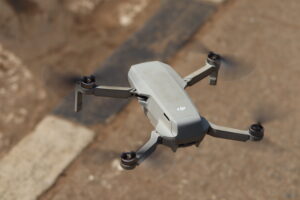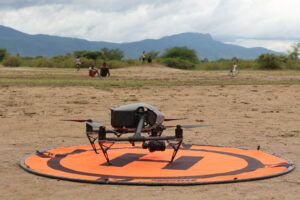By Amber Persson
Imagine that a mother of five in rural Niger suddenly develops a fever, headache, and nausea; the diagnosis—malaria. She must receive treatment as soon as possible before the swift-acting disease develops further. Unfortunately, her community is largely inaccessible by road, and there are no hospitals in the vicinity. It could take several days before she is able to receive the anti-malarial medication she needs. A new program aims to address this life-threatening challenge.
Drones Can Provide a Solution for Remote Communities
In 2016, UNICEF proposed using drones to transport medications, vaccines, and diagnostic biological samples to solve health crises like this one. A drone is able to deliver lifesaving medications in hours as opposed to days or weeks. For this mother, a few days could mean the difference between recovery and fatality.

Source: Wilson Oluoha Wikimedia Commons
Drones were first used in Malawi to assist with the HIV testing of infants by transporting blood samples from remote communities directly to laboratories. The initiative was soon expanded to Vanuatu, a country in the South Pacific, where vaccines were effectively distributed using drones. Before this project, 20% of children in Vanuatu were unable to access vaccines because of the country’s 1300 km of mountainous terrain and limited healthcare infrastructure. Vaccines were often delivered on foot in coolers, a journey that can take several days. The drones made the journey in a mere 25 minutes.
Drones have also been employed for surveillance of areas affected by natural disasters. They can easily assess the extent of flooding and damage, identify communities most in need, and be used for search and rescue purposes.
As powerful as drones can be, they require training to operate and maintain, and the data they collect must then be analyzed. This is a challenge in disadvantaged communities that lack the capacity to build and support such an initiative.
This is why the African Drone and Data Academy (ADDA) was created. ADDA is a global initiative spearheaded by UNICEF that aims to increase the accessibility of health-related materials and diagnostic testing by training drone operators. Potential pilots take three courses over 11 weeks in which they learn drone basics, planning, and data logistics. Through these courses, pilots gain valuable hands-on experience tailored to the Global South.

Source: Anouk Delafortrie
African Drone and Data Academy in Niger
ADDA was recently adopted in Niger with the support of the Nigerien government. In collaboration with Virginia Tech University, the curriculum was translated to French so it could be taught in the Sahel region. After preparing five Nigerien drone instructors, the first class of 24 youth graduated the ADDA training program in 2022. 60% of the students in this class were women.
ADDA encourages young people to get excited about helping their community. It also provides a clear employment path that culminates in a remote pilot license, which would otherwise be reserved for more privileged individuals. Addressing the drone piloting skills gap enables young people to obtain well-paid jobs, boost local economies, and contribute to something greater than themselves.
The safe local wells that Wells Bring Hope drills enable more girls and women to attend school and contribute to their communities in a bigger way, maybe one day by piloting a drone.
Sources:
https://www.unicef.org/innovation/dpg-pathfinding-countries/niger
https://www.unicef.org/innovation/AfricanDroneAcademy
https://canso.org/drone-skills-vital-to-african-success/


